Trump’s travel ban motivated Muslims to participate in politics. Now, they’re eyeing local office
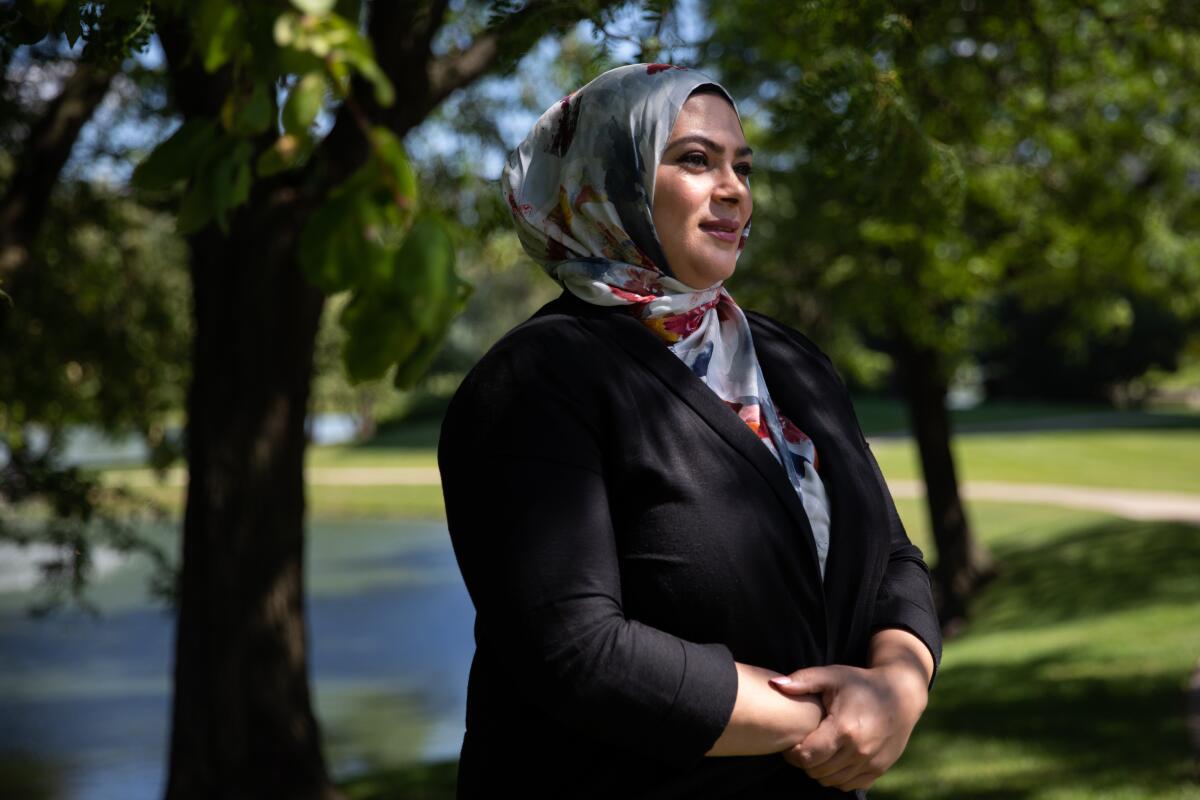
- Share via
DEARBORN, Mich. — The five young Muslim Americans huddled around a table inside the Yemeni coffee shop, pouring adeni chai into curved red and gold glasses. Voice by voice the discussion turned to why they must make their presence felt on Nov. 3, and the need to hold politicians’ feet to the fire on issues like immigration, racial justice and foreign policy.
“For a long time, Muslims have felt a lot of bigotry and racism, and just feeling like our contributions in society weren’t looked at or held like other communities,” Adam Abusalah, 19, told the group from behind his mask.
That era is ending, Abusalah went on, because young Muslims like him are putting traditional career aspirations on hold in favor of getting politically active.
“Trump’s election, that was just the icing on the cake,” he told the gathering, whose members are of Lebanese, Palestinian, Iranian, Yemeni and Iraqi ancestry. “Muslims said, we’re not going to only be doctors and engineers, but journalists and policymakers.”
Amid the cacophony of baristas grinding coffee and mixing drinks, they debated the efficacy of voting for president compared with voting down the ticket, or participating in community outreach and street marching.
Machhadie Assi, a 35-year-old Lebanese immigrant who phone-banked for Sen. Bernie Sanders’ presidential campaign in 2019, said that experience gave her a sense of how many local Muslims felt that their votes wouldn’t make any difference. She persuaded at least 10 of her friends to cast their ballots in the primary election, she said, and helped three elderly women register to vote.
“Muslim people have been more engaged since 2016, post-Muslim ban, because they became more aware of their Muslim identity,” she said, referring to President Trump’s controversial 2017 order suspending immigration from several predominantly Muslim nations.
In few places is that spike in engagement, particularly among younger people, as clear as in this southeastern corner of Michigan, home to one of the oldest and largest Arab American and Muslim communities in the country.
Four years ago, then-candidate Trump won this battleground state by fewer than 11,000 votes. Michigan overall recorded a 19-point increase in Muslim voter turnout between the 2014 and 2018 midterm elections, according to data from Emgage, a national get-out-the-vote group that focuses on Muslims. Analysts believe that Muslim Michiganders — who surveys indicate are focused on such issues as civil rights, education and healthcare — could help play a decisive role in this year’s election if they turn out in equal, or even greater, numbers.
The surge in Muslim voter participation in Michigan parallels an increase in the number of Muslims running for office. Muslim politicians in the state hold office at all levels — from school boards to the House of Representatives.
It’s a trend that’s picking up in other cities and states. Nationwide, a record number of Muslims ran for office in 2018. More than 80 ran for state and local offices across the country in 2019; at least 39 of those won, according to a report from the Council on American-Islamic Relations, known as CAIR, and Jetpac.
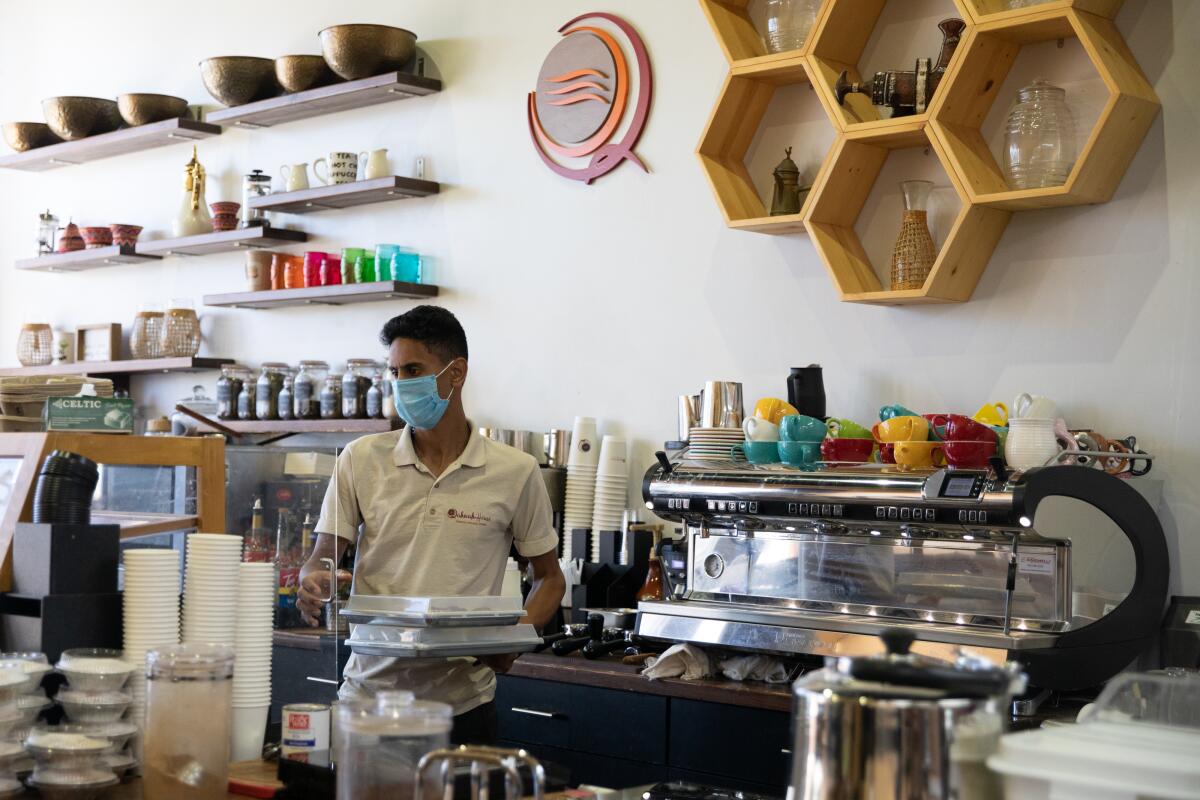
Muslims and Arab Americans began arriving in the Detroit metro area in the late 1800s and early 1900s to work in the booming auto plants, including Henry Ford’s legendary River Rouge complex. Today, roughly 43,500 of Dearborn’s 95,000 residents claim Arab ancestry, many of them from Lebanon, Iraq, Yemen and the Palestinian territories, according to the U.S. Census Bureau’s 2018 American Community Survey five-year estimates. Community estimates put that figure higher, with at least 60% of Dearborn’s residents coming from an Arab background.
Although not all Arab Americans are Muslim, the majority in this town are. Dearborn is the site of one of the largest mosques in North America, whose congregation can trace its history back 100 years.
The state also is the birthplace of the Nation of Islam, a Black political and religious movement founded by Wallace Fard Muhammad in 1930. More broadly, Black people account for one-fifth of U.S. Muslims, according to the Pew Research Center.
In Dearborn, it’s not uncommon to hear a group of friends mixing Arabic and English as they walk by. Drive down Schaefer Road, you’ll pass by Masri Sweets, Alsaeedah Grocery and Spices, and Alghadeer before reaching Qahwah House, the shop where Abusalah and others had gathered on a recent afternoon.
“Michigan is home to many different kinds of Muslims,” said Nada Al-Hanooti, executive director of Emgage Action Michigan, an arm of Emgage. “The Nation of Islam was started in Detroit — it’s foundational to African American Islam. And we have a huge Pakistani, Desi Indian community and the Arab American community.”
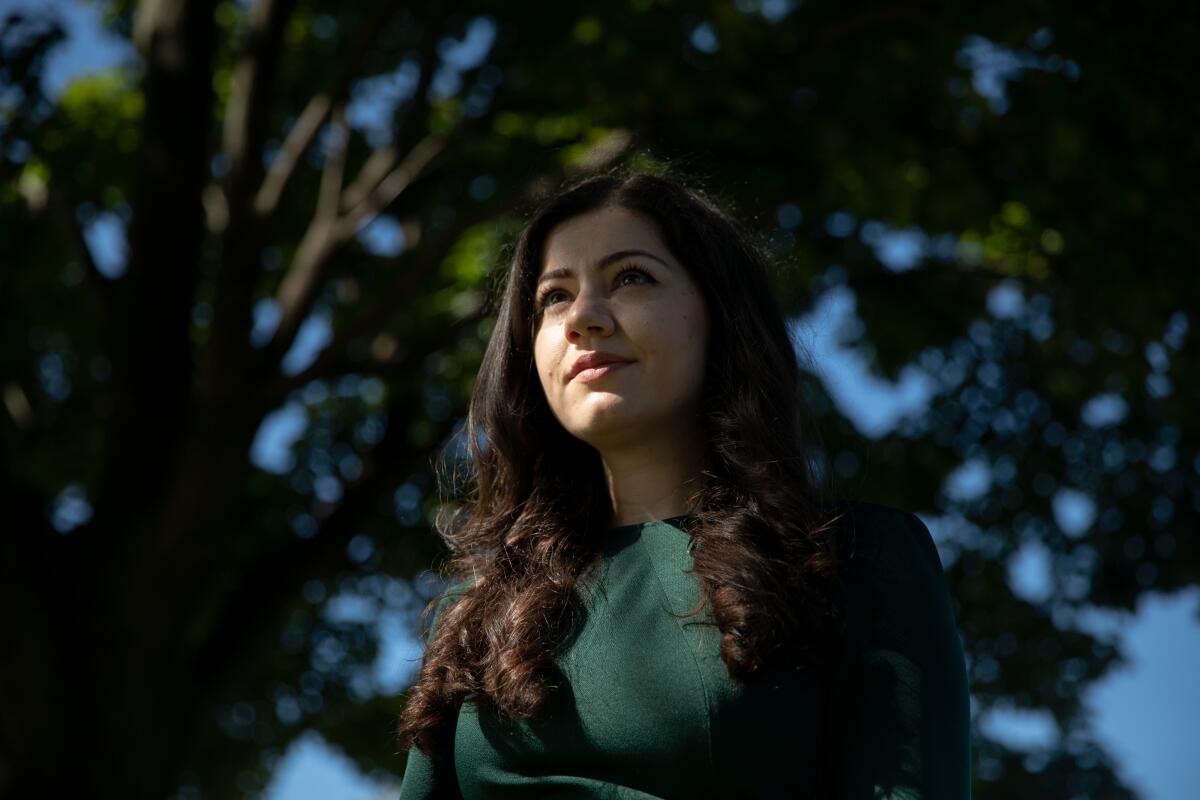
In the decades since the Lebanese civil war, Iran’s Islamic Revolution and other upheavals in the Middle East and North Africa drove thousands of refugees to the United States, conventional wisdom has held that voters in enclaves such as Dearborn and L.A.’s Westwood were primarily focused on issues affecting their homelands.
But top of mind for many voters here this fall are not only long-standing issues of immigration and Middle East foreign policy, but also hyper-local concerns including air pollution and asthma rates, particularly in the industrial south end of Dearborn, where there is a large Yemeni community, and rising healthcare concerns amid the COVID-19 pandemic.
Community leaders attribute the uptick in civic engagement in part to Trump’s election and his anti-Muslim rhetoric and restrictive immigration policies. But they also point to the influence of decades of grass-roots organizing and outreach by Muslim organizations as the community itself matured.
Although Muslims — who make up about 1% of the nation’s population — are a small voting bloc, experts say that their votes, and their rate of participation, can play a role in close elections. Activists say that Michigan Muslims’ support for Sanders helped to put him ahead of Hillary Clinton in the battleground state’s Democratic primary in 2016.
“American Muslims are definitely at a cross point, a major juncture of where they stand in the U.S.,” said Karam Dana, an associate professor of Middle East politics at the University of Washington, Bothell. “Muslim Americans are playing the most significant role they have played ever, in 2020.”
Youssef Chouhoud, an assistant professor of political science at Christopher Newport University, said much of the credit for Muslim voters’ growing involvement in politics belongs to Muslim American organizations doing outreach and educational work.
“I think what we have been seeing,” he said, “is really sowing the seeds for what will be the foundation of perhaps Muslim political consciousness for years to come.”
The Muslim community is still fairly nascent in its political identity, Chouhoud added. Muslim Michiganders have been running for office for decades, but in other states it’s historically been a harder ladder to climb.
“There have been more Muslims that have run for public office going back to the second year of the [George W.] Bush term, and it has steadily increased,” said Dawud Walid, executive director of CAIR’s Michigan office. “It’s a natural maturation of the Muslim community, like other immigrant groups in previous decades.”
After the Sept. 11 terrorist attacks, Walid said, many Muslims who had previously been apolitical were “forced out of that box” because of “the rise of racism and xenophobia, which Muslims have faced from not simply individuals but as it relates to government policy.”
Walid also pointed to what he called a “Trump effect” that he said has pushed the Muslim community farther to the left than it was when President Obama first ran for office. About 76% of Muslims who cast ballots in the 2018 midterm election voted for a Democrat, while only 13% voted for a Republican, according to a 2019 study by the Institute for Social Policy and Understanding. At the same time, only 73% of eligible Muslim voters report being registered to do so, the least likely among religious groups surveyed.
But the study also found that, despite this registration gap, Muslims ran in the 2018 midterm election “in unprecedented numbers, recording as many as 131 wins at local and state levels, and securing three congressional positions.”
::
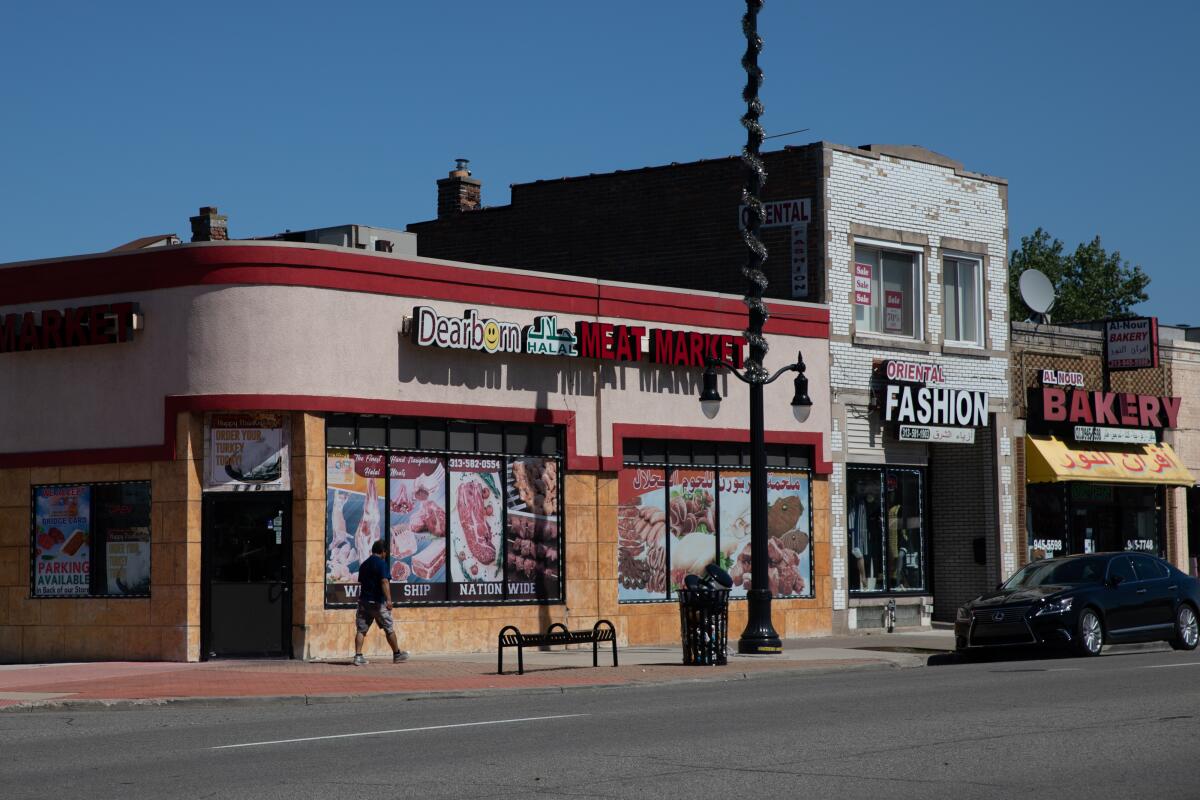
The Detroit metro area has a rich history of Muslims in politics. But it wasn’t until 2016 that Dearborn residents who weren’t previously civically engaged felt hyped up for a candidate, Al-Hanooti said.
“The first candidate we got excited about was Abdullah Hammoud,” she said, referring to the first Arab American Muslim elected to represent Dearborn’s 15th District in the state House of Representatives, in 2017. “There’s living proof that people who have started in the grass-roots level, people who started out by canvassing, are doing big roles. It’s about inspiring your community, and it starts from the ground.”
And it was the 2018 midterm election — the one that saw Rep. Rashida Tlaib’s historic, successful run for Congress — that brought people out in droves. Tlaib, 44, the Detroit-born daughter of Palestinian immigrants, is one of the four female Democrats — along with Alexandria Ocasio-Cortez of New York, Ayanna Pressley of Massachusetts and Ilhan Omar of Minnesota — who make up the progressive group of first-term U.S. House members, and outspoken Trump adversaries, collectively known as “the Squad.” Both Tlaib and Omar are Muslim.
In Wayne County, which includes the city of Detroit, 32,126 Muslims turned out to vote, roughly 44% of the entire state’s Muslim voter turnout in the 2018 midterm, according to data from Emgage.
“People don’t want to sit on the sidelines,” said state Rep. Hammoud, a Dearborn native, who attributes his victory three years ago to the greater turnout of Arab American and Muslim voters. “As we mature in American life, you see that Muslim Americans are part of the fabric and at every level of decision-making.”
::
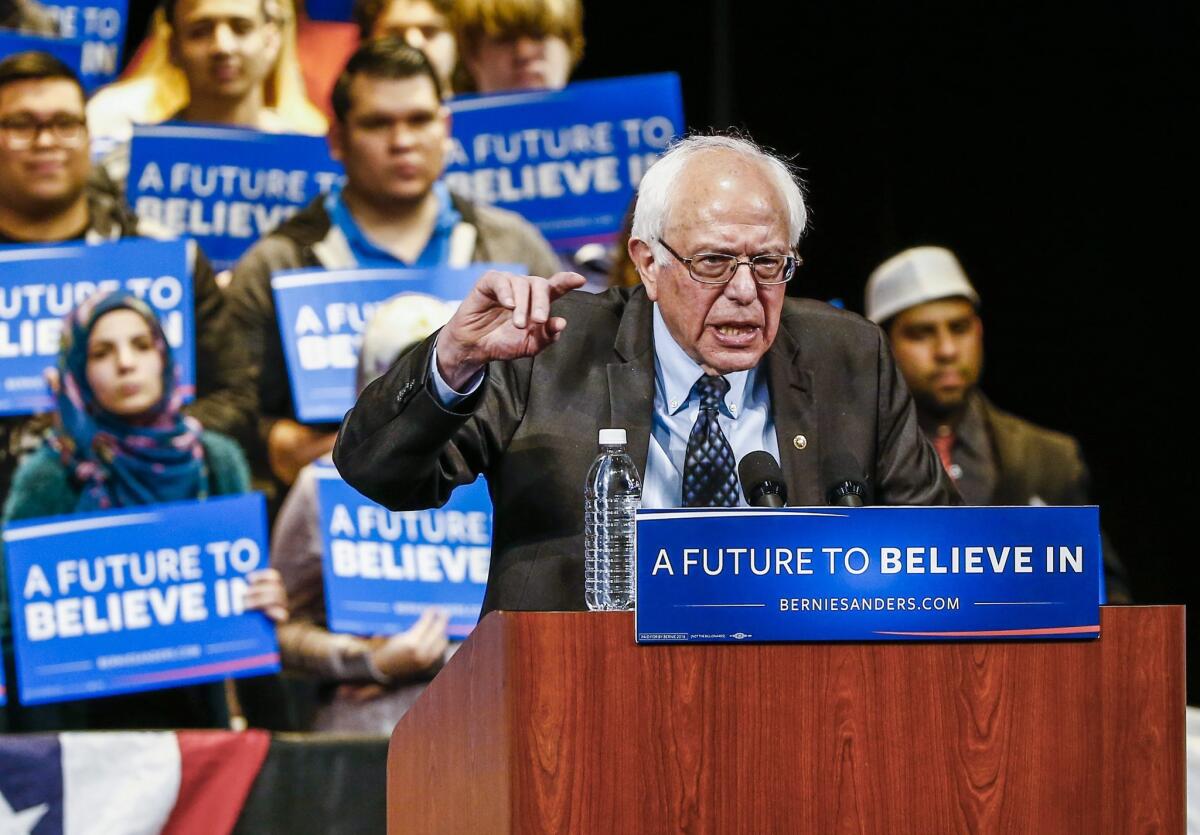
When George W. Bush ran for president in 2000, the Republican Party seemed like it could be a natural home for many Muslims. A group of Muslim organizations at that time called for a meeting with both Bush and Al Gore, the Democratic nominee, to discuss whether Muslims would be included in the candidates’ administrations, said Hussam Ayloush, executive director of CAIR’s Greater Los Angeles office.
Bush, who had made an effort to court Muslims during his campaign, accepted the invitation; Gore did not, according to Ayloush. Surveys at the time showed that about 80% of American Muslim voters supported Bush, Ayloush said.
“Obviously things changed,” he said. “After the election came 9/11. Here comes the Patriot Act ... and U.S. foreign policy took a major shift, even worse than before.”
Then came Barack Obama, whose election showed the community that “you could be different from mainstream and make it,” Ayloush said, adding that Obama brought a new and inclusive tone to the White House.
But it was Sanders’ presidential campaigns that truly energized Muslim voters.
“We felt that in the primary election,” Al-Hanooti said. “We had such a large number of old Muslim women and grandfathers crowded at City Hall the day of the primary to vote for Bernie Sanders.”
Other Democratic presidential hopefuls have visited mosques on the campaign trail over the last two years, or spoken to Muslim groups. But Sanders went further, naming a Muslim as his campaign manager, tapping a prominent Muslim Palestinian American activist as a surrogate and visiting Muslim communities.
“Obama, his first four years he didn’t visit a mosque because of allegations that he was Muslim. It took his second term to visit a mosque — I mean, come on,” Al-Hanooti said. “With Bernie, what was so remarkable was he hosted a rally in the south end, with the Yemeni community.”
She paused, fighting back tears.
“It was beautiful. This is what we strive for. That’s what we want. We want to be seen as equal,” Al-Hanooti said. “One thing that really engaged the Arab American and Muslim community was Palestine. The fact that he recognized their right to exist played a huge role in their support of Bernie.”
With Sanders out of the race, many in the community plan on backing Democratic nominee Joe Biden, even if he wasn’t their first choice, she added. The former vice president and his team have made overtures of their own to Muslim voters, through virtual voter summits, fundraisers and roundtable phone calls with community leaders.
Biden also has appointed a “senior advisor for Muslim engagement” to his presidential campaign, according to his website, which hosts a page dedicated to his “agenda for Muslim-American communities.”
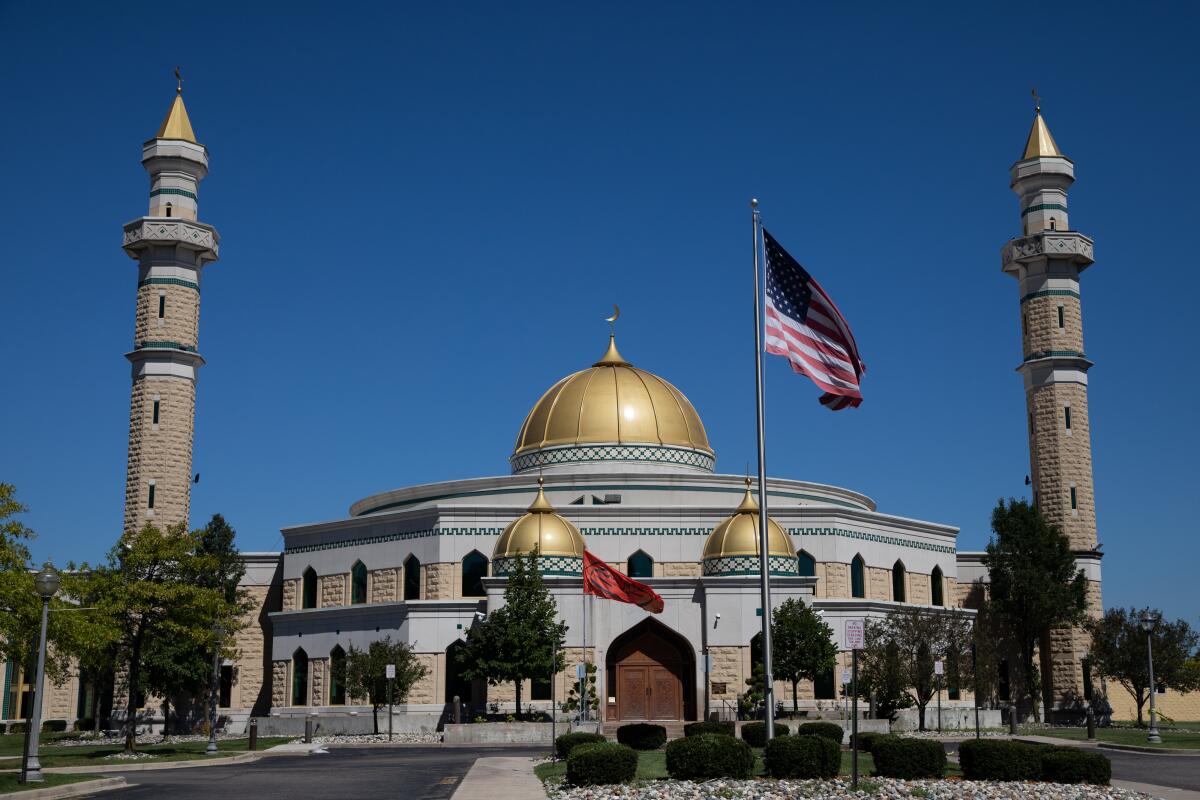
Kassem Allie, executive administrator for the Islamic Center of America, cautioned that although presidential candidates now recognize the influence of Muslim voters, “the Muslim voting bloc, if there is one, cannot be taken for granted,” especially by Democrats.
Seated in his office at the Dearborn mosque, the 62-year-old emphasized that Muslim voters aren’t monolithic; just because the majority lean toward the Democratic Party, it doesn’t mean that others won’t vote for a Republican in a local, state or federal race.
“We are not a community that can be ignored like in the past, because we have gained so much in terms of stature in different sectors of the political landscape,” said Allie, who immigrated to the U.S. from Lebanon nearly 40 years ago. “This time around we will be effective.”
More to Read
Get the L.A. Times Politics newsletter
Deeply reported insights into legislation, politics and policy from Sacramento, Washington and beyond. In your inbox three times per week.
You may occasionally receive promotional content from the Los Angeles Times.











